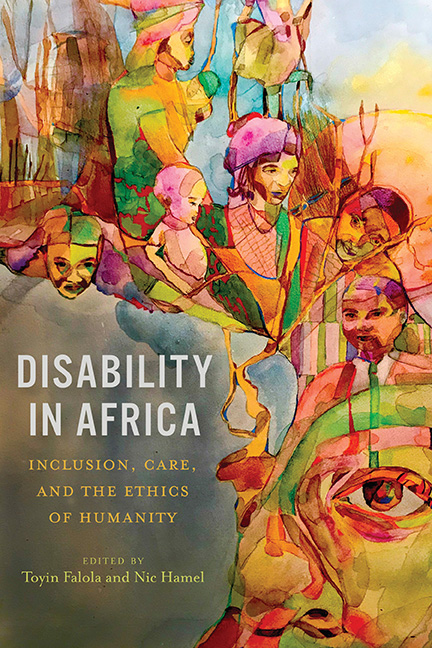Book contents
- Frontmatter
- Dedication
- Contents
- Part One Introducing the Field
- Part Two Theorizing Disability in Africa
- Part Three Representation and Cultural Expressions
- Part Four Education, Community, and Caregiving
- Part Five Activism and Barriers to Inclusion
- Conclusion: A Research Agenda for African Disability Studies
- Selected Bibliography
- Notes on Contributors
- Index
13 - Youth, Women, and Disability in Africa: Economic Empowerment and Community Strategies to Leave No One Behind
Published online by Cambridge University Press: 17 June 2021
- Frontmatter
- Dedication
- Contents
- Part One Introducing the Field
- Part Two Theorizing Disability in Africa
- Part Three Representation and Cultural Expressions
- Part Four Education, Community, and Caregiving
- Part Five Activism and Barriers to Inclusion
- Conclusion: A Research Agenda for African Disability Studies
- Selected Bibliography
- Notes on Contributors
- Index
Summary
Introduction
Africa has a youthful population, many of whom are unemployed. The United Nations Convention on the Rights of Persons with Disabilities recognizes the right of disabled persons to have the same rights as nondisabled people in the workplace. However, the inequality gap in employment between disabled persons and those without disabilities is still wide, especially for women and youth, both male and female, in Africa. The United Nations recognizes that without access to financial services, many are unable to increase their incomes. Access to economic services is thus seen as key to achieving this goal. Work is the means by which an individual can secure the necessities of life. The right to decent work, employment, and financial inclusion is a fundamental human right recognized by the Sustainable Development Goals (SDGs) for the attainment of a holistic global development for all.
Despite achieving some of the Millennium Development Goals (MDGs) noted in 2015, an estimated 825 million people were reported as living in extreme poverty, and eight hundred million people suffer from hunger. The assessment of progress toward the MDGs highlighted that the poorest along with those disadvantaged because of gender, age, disability, or ethnicity are often bypassed.
Building on the MDG achievements, the 2030 Agenda for Sustainable Development Goals (SDGs) aims to completely eliminate extreme poverty by 2030. While the SDG 1 stresses the eradication of extreme poverty by ensuring social protection for the poor and vulnerable through increased access to basic services and support, the SDG 8 promotes the right to full, inclusive, sustainable, and decent work for all through the eradication of inequalities of unemployment. These policies echo the fact that an environment that enables the generation of income, including opportunities for employment and decent work, should be made available for all on an equal basis.
From a cultural perspective, Tshabalala notes that personal experience indicates a gap between the Western and African schools of thought around managing and dealing with money. She suggests that financial systems need to address cultural dynamics to be inclusive of and accessible to the African population. This approach will positively impact people's ability to manage finances. Furthermore, the issue of language presents a challenge to most rural Africans whether they are literate, illiterate, or with disabilities.
- Type
- Chapter
- Information
- Disability in AfricaInclusion, Care, and the Ethics of Humanity, pp. 286 - 305Publisher: Boydell & BrewerPrint publication year: 2021



